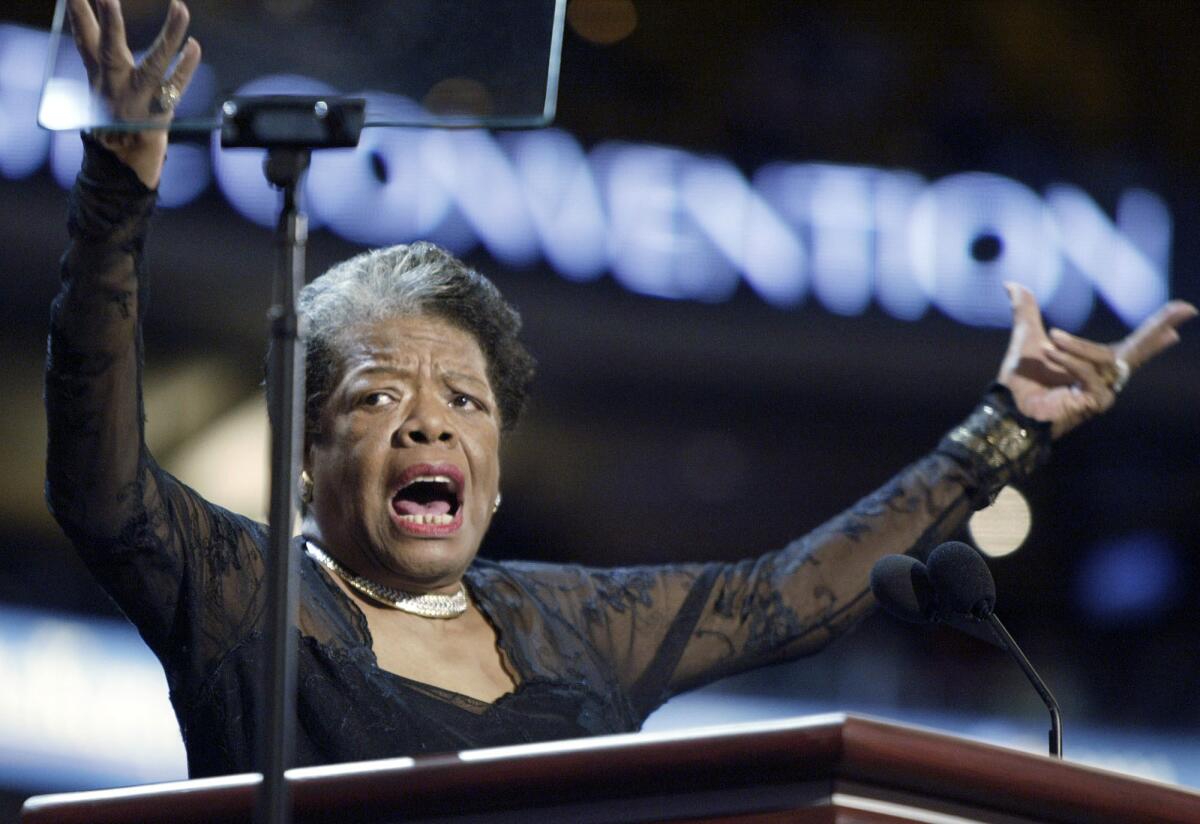When Maya Angelou was reviewed by Wanda Coleman

- Share via
When I think of Maya Angelou, who died Tuesday at age 86 at her home in Winston-Salem, N.C., I recall Wanda Coleman’s review of her memoir “A Song Flung Up to Heaven,” which appeared in the Los Angeles Times Book Review in April 2002.
By that point Angelou had been a major cultural figure for nearly half a century, a dancer and actress (she appeared, with James Earl Jones, Cicely Tyson and Godfrey Cambridge, in a celebrated 1961 production of Jean Genet’s “The Blacks”) whose 1969 memoir “I Know Why the Caged Bird Sings” — the writing of which was encouraged by her friend James Baldwin — offered a searingly personal evocation of the degradations of racism and violence.
“I Know Why the Caged Bird Sings” put Angelou at the forefront of a wave of female African American writers, including Toni Morrison, Toni Cade Bambera and Audre Lorde. The power of the memoir, Hilton Als observed in the New Yorker, lies in Angelou’s willingness to break down an essential barrier, writing “about blackness from the inside, without apology or defense.”
Coleman, of course, was very much her literary descendant, a poet and essayist who also wrote scathingly about race and class. And yet, she lamented in her review, Angelou had regressed in this, her sixth memoir, to “empty phrases and sweeping generalities.”
To read Coleman’s review now is to marvel, in some ways, at its fairness; she goes out of her way to praise “Caged Bird,” as well as Angelou’s 1986 book “All God’s Children Need Traveling Shoes” and to note her role in Bill Clinton’s 1993 inaugural.
In the moment, though, it sparked a controversy that culminated in Coleman being disinvited from an event at L.A.’s leading African American bookseller, Eso Won Books — although Angelou, to her credit, did not take part in the back-and-forth.
As to why this matters, it tells us something about how we band together behind the writers and artists we consider icons, those who say something important about the way we live. For many readers — Coleman among them — Angelou was precisely such a figure, which is why this review caused such a stir.
I’ve long believed that the most vivid negative reviews are written out of love, or more accurately love disappointed, that the response is a reflection of how important the writing ought to be. This, I’d suggest, is what motivated Coleman: the desire to take Angelou seriously, not as legend but rather as an essential voice in the community.
“What I have always wanted is to be of use,” Angelou once noted. “I will not be abused. I will not be misused — not willingly. But I will be of use. Anybody who is not of use is useless.”
The same might be said of Coleman. In that sense, she was paying Angelou the respect she deserved as one of the progenitors of contemporary African American literature: one truth-teller writing about another truth-teller, holding both of them to the highest standards of their art.
More to Read
Sign up for our Book Club newsletter
Get the latest news, events and more from the Los Angeles Times Book Club, and help us get L.A. reading and talking.
You may occasionally receive promotional content from the Los Angeles Times.











